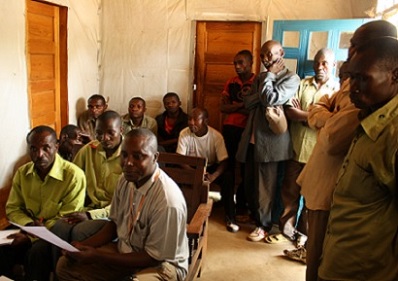Arbitrary expropriation of resources will sometimes be achieved by means of violence in economies where property rights are weakly enforced. However, in some contexts there might be higher private gains to be made by agents with access to means of violence from protecting property rights, promoting the economy, and systematically taxing the private sector instead. Existing historical accounts of the formation of modern states hinge on Middle-Ages warlords and bandits organizing into governments that collect taxes, provide security, and administer justice as a response to higher returns from resource extraction. These theories lack systematic empirical evidence, owing to the difficulty of obtaining historical disaggregated data on this transformation process. This project will use data on modern-day Eastern Congo to test whether the returns to taxation explain the establishment of protection, taxation and dispute resolution institutions.
Eastern Congo is suited to address this question. The state is weak and armed groups have been operating since the 1990’s. There is evidence that armed groups engage in violent expropriations, but they often prefer to settle, build local institutions, provide public goods, collect taxes, and even enjoy legitimacy by the local population in many areas where state representatives are absent and law enforcement is limited.
The researcher will collect village-level panel data on armed groups’ local extraction strategies from the private sector in Eastern Congo dating back to 1990, as well as make use of well-documented historical changes in the global demand for minerals from this region, to test whether these strategies are driven by the value of taxable output. Armed groups’ efforts to capture resources through peaceful taxation will also depend on the ease of tax evasion by the private sector. The data collection strategy will thus seek to explore whether minerals prone to tax evasion drive armed groups to forego this source of income and rely on tax revenue from other economic activities. These constraints might result in a lower share of output being taxed, thereby making it less profitable for these armed groups to establish institutions of protection and taxation.
The causes and effects of the different types of violence to which Eastern Congo has been subjected will also be explored. The data will contain variables on households’ economic choices since 1990 (including crop choices, savings and investment choices, migrations and marriages), as well as include information on local prices, local exchange rates, types of taxes collected by armed groups, and exposure to violence at both the village and individual levels.
To minimize error due to recall, surveys will be implemented on the basis of historical time cues, measures of respondents' working memory will be collected, and the data collection team will be cross-checking evidence from different sources, including group meetings with sector specialists. The preliminary data was validated based on known historical facts.
There is limited data available on the hurdles to private sector development in economies facing both a weak institutional structure and a state of violent conflict; nor is there much literature on the economic rationale that might drive agents with access to means of violence. The objective of this project is thus to develop a dataset that will feed into a long-term research agenda on the interaction of agents with access to means of violence with the private sector, making this an invaluable contribution to the academic literature.






